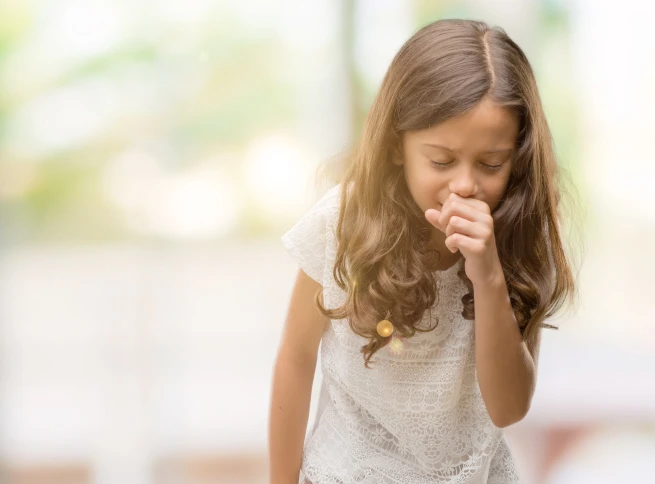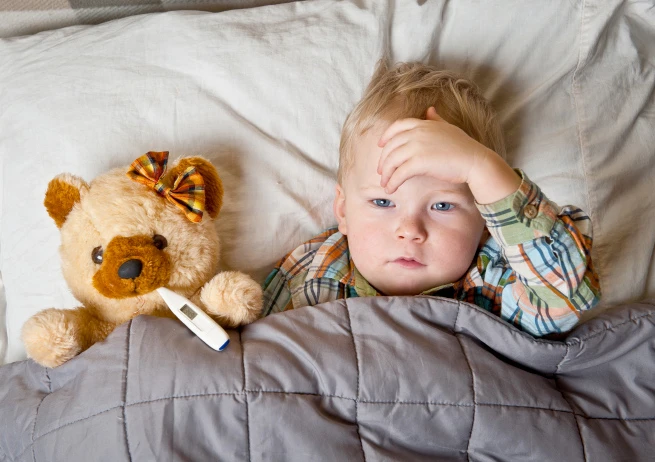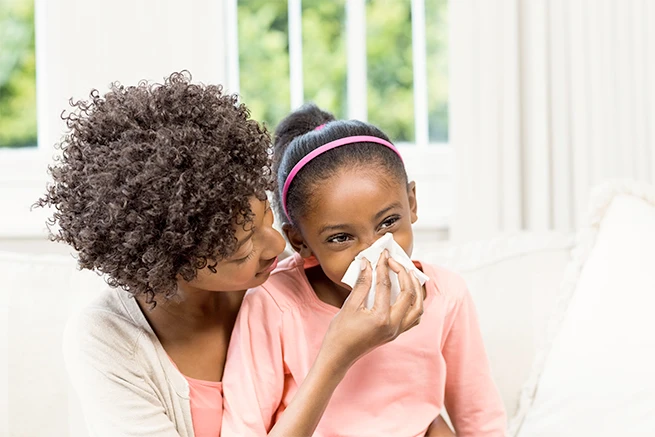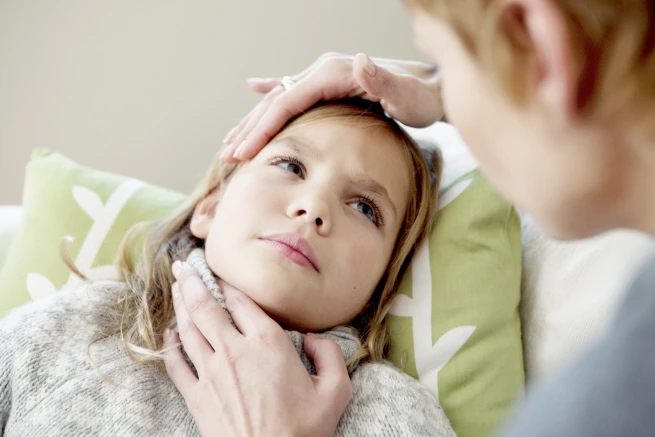Types of cough
Just like adults, babies and children can develop different types of coughs that can clear up quickly or linger for longer. How long your little one’s cough lasts for can determine the cause and the treatment.
Chesty coughs – a build-up of mucus at the back of the throat or on the chest can result in a chesty phlegmy cough.
Dry coughs – a tickly throat can result in a dry cough, your little one won’t produce phlegm with this type of cough.
Coughs can be described as acute or chronic. Coughs lasting three weeks or less are said to be acute and are usually caused by a virus or infection. Self-help remedies and plenty of rest are usually enough to help you through. If your child’s cough lasts for more than eight weeks, doctors will consider this to be a chronic or persistent cough. This kind of cough may be linked to an underlying or pre-existing health condition such as asthma, an allergy or reflux.
Causes of coughs
Coughs are most often caused by the cold or flu virus, but not always. Below we explore some of the most likely explanations behind your child’s cough.
Common cold: Coughs and colds often go hand-in-hand, and while a cold can leave your little one out of sorts for a few days, the symptoms they cause such as a cough aren’t usually anything to worry about. Other symptoms that could indicate your child’s cough is caused by a cold are a runny nose, watery eyes, sneezing, tiredness, a raised temperature and sore throat.
Flu: A dry cough is symptomatic of the flu. Symptoms can resemble those of a cold, but develop much more rapidly and affect more than the nose and throat. Children can develop ear pain and often become less active.
Allergies: Allergens and irritants such as food, dust, pet dander and pollen can cause a lingering cough in your child, as well as give them watery or stinging eyes, runny nose, sore and/or itchy throat, rash and sneezing. Allergies are unlikely to be accompanied by fever.
Chest infection: A chesty cough can be a symptom of a chest infection, which can develop following a cold. Mucus is likely to be yellow or green, due to the infection. Other signs your child may have developed a chest infection include wheezing, shortness of breath, a fever of 38C or over or chest pain.
Whooping cough: Whooping cough (pertussis) is a highly contagious bacterial infection of the airways. As the name suggests, your child will make a ‘whoop’ sound between normal-sounding coughs if this is what’s causing it. Bouts of coughing can last for several minutes and are usually worse at night. Your little one might cough up thick mucus that can also make them sick.
Whooping cough can be serious, particularly if your baby is under six months old. Older children are less likely to have a severe reaction.
If your child develops a bad cough that is getting worse, or develops symptoms of whooping cough and is under six months of age or has a weakened immune system and has been in contact with someone with whooping cough, call your GP for advice. Your doctor may wish to prescribe antibiotics.
Paediatric nurse Dawn Kelly says: “A whooping cough is a cough followed by a sharp ‘whoop’ breath. With croup, it’s the cough itself that has a distinctive sound; like a seal bark.”
This content was written by healthcare professional Dawn Kelly in 2020. She was paid for her time but does not endorse CALPOL® Products.
Croup: Croup is a childhood condition that produces a distinctive seal-like bark or cough. Symptoms are often worse at night. and include a hoarse voice, difficulty breathing and a rasping sound when taking in air. If your child has croup, it’s likely they will first develop common cold symptoms such as a runny nose, raised temperature and general cough. Keep your child calm, sit them upright and give them plenty of fluids and your little one should find their symptoms reduce in a couple of days.
Bronchiolitis: A cause of cough that’s more common in children than adults, bronchiolitis is a mild infection of the airways that can cause a cough.
Asthma: Asthma could cause your child to wheeze, have a tight chest that can cause breathlessness and develop a dry cough that doesn’t produce mucus. A cough caused by asthma will usually be worse at night or with physical activity.
Choking: Inhaling or swallowing something like a piece of food or a small toy can cause the cough reflex to kick in as your child tries to clear their airways.
Reflux: Your baby or young child under the age of one might have a cough caused by reflux if they are prone to bringing up milk or being sick shortly after feeding. Acid reflux is caused by stomach acid moving up the oesophagus, which irritates airways and triggers a cough.
Why does my child cough more at night?
One of the main functions of a cough is to clear mucus from our throats and airways. When lying down, the mucus is more likely to cause problems as it will collect in the back of the throat, so your baby or child coughs more at night.
Several conditions could cause children and babies to cough more during the night. These include:
Croup – the cough often becomes worse at night.
Asthma – can often cause a bout of coughing at night.
Acid reflux – this can often be worse at night, causing a cough
Cough medicines and remedies for children and babies
With plenty of rest and fluids, most coughs in younger kids and babies tend to clear up within three to four weeks. Depending on what’s causing the cough, there may be things you can do to help soothe your child.
Cough medicine for kids
For children aged under six, simple cough syrups that include glycerin, honey and lemon (honey should only be consumed by children aged 1 year and over) can be given to help relieve a cough. If your child is aged between 6 and 12 years, you can try a children’s chesty or dry cough medicine from your local pharmacist.
CalCough Infant Syrup can be used from 3 months to soothe and relive dry, tickly coughs. CalCough Children’s Syrup can be used from 1 year and provides effective relief from dry, tickly coughs and sore throats. If you have any dosage questions, view our online dosage guide.
Home remedies for kids’ coughs
Medicines can be great to help ease a cough, but there’s also plenty you can do at home.
Paediatric nurse Dawn Kelly says: “While a cough can be upsetting for parents and uncomfortable for little ones, they should get better on their own in a few weeks. Make sure your child gets plenty of rest and stays hydrated to help them feel better.”
This content was written by healthcare professional Dawn Kelly in 2020. She was paid for her time but does not endorse CALPOL® Products.
For children aged over one, try giving them half a teaspoon of honey and some lemon in warm water before bed.
Provide a calming sleep environment to help them feel relaxed at night.
Giving lots of cuddles can also help your child relax.
Ensure they drink plenty of fluids as keeping hydrated can help loosen phlegm.
Tips to help relieve coughing at night
A good night’s sleep can help get your little one back to their usual vibrant and energetic self. Here are some ideas to try if you’re finding they’re waking up and coughing a lot in the night.
Humidifier – by using a humidifier you can regulate the moisture in the air, making it easier for your little one to breathe and reduce irritation that could bring on a coughing fit.
Raise their head - place something underneath the mattress to raise the head of the bed slightly to help them breath better. If your baby is under 6 months, do not place anything underneath or on top of their mattress, like an extra pillow or blanket, as in very rare cases this may cause SIDS (sudden infant death syndrome).
For more information on SIDS, visit the NHS webpage.
When to see a doctor for a cough
You should contact a GP or call 111 if your baby or child has a:
Cough that won’t go away – your child has had a cough for more than three weeks.
Continuous cough that gets worse at night or with exercise, as it may be asthma.
Very high temperature or they feel hot and shivery, as they may have a chest infection.
Go to A&E or call 999 if your child:
Is finding it difficult to breathe, as they may need urgent hospital treatment.
Last reviewed 2020 by qualified paediatric nurse Dawn Kelly, a health visitor, lecturer and mother-of-three. Dawn was paid for her time and does not endorse CALPOL® products.
Home remedies for kids’ coughs
For children aged over one, try giving them half a teaspoon of honey and some lemon in warm water before bed.
Provide a calming sleep environment to help them feel relaxed at night.
Giving lots of cuddles can also help your child relax.
Ensure they drink plenty of fluids as keeping hydrated can help loosen phlegm.

Corona Virus
At the moment it can be hard to know what to do if your child is unwell. It's important to trust your instincts and get medical help if you need it. If you think your child may be suffering from COVID-19 symptoms, visit the NHS website for further information.

Health Visitor
Dawn Kelly
Dawn is a qualified paediatric nurse, health visitor and lecturer with over 25 years’ experience. She’s written widely about child health and development and has a wealth of knowledge about childhood illnesses and advising parents on issues such as weaning and sleep. Her three daughters also put her knowledge to the test!
This HCP does not endorse Calpol.



